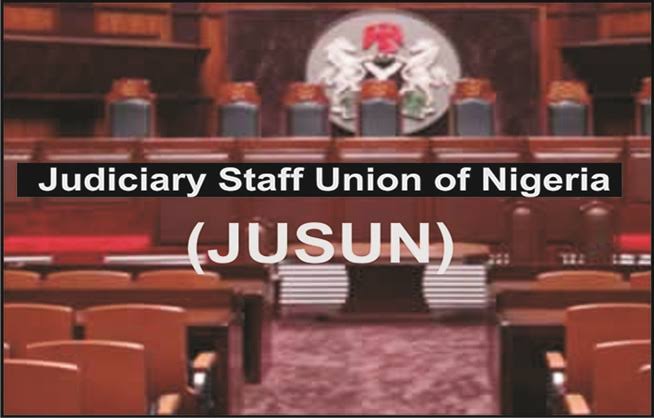The Judiciary Staff Union of Nigeria (JUSUN) has suspended its nationwide strike, which halted court operations across the country on June 2, 2025. The decision, announced late Monday evening, followed intense negotiations with key stakeholders, including the Chief Justice of Nigeria, Justice Kudirat Kekere-Ekun, the Minister of Labour and Employment, Muhammad Dingyadi and other high-ranking officials. JUSUN has issued a one-month ultimatum to the Federal Government to address its demands, setting the stage for a critical period that could shape the welfare of judicial workers and the functionality of Nigeria’s courts.
Background of the Strike
The strike, which began on June 2, 2025, brought judicial activities to a standstill, leaving courtrooms empty and cases stalled from Lagos to Abuja. JUSUN’s action was a bold response to long-standing grievances over the welfare of judiciary workers, who play an essential role in upholding Nigeria’s justice system. The union’s demands are clear and multifaceted, reflecting the economic and professional challenges faced by its members. These include the immediate implementation of the ₦70,000 national minimum wage, the payment of five months’ wage award arrears, and the enforcement of a 25/35 percent salary increase.
The ₦70,000 minimum wage, signed into law in July 2024, remains unimplemented for many judicial workers, despite its adoption in other sectors. The wage award arrears, intended to mitigate the impact of economic reforms, have also not been paid for five months, leaving workers financially strained. The demanded salary increase is seen as vital to aligning judicial workers’ pay with Nigeria’s rising cost of living, which has surged due to inflation and economic pressures.
Negotiations and Suspension
The decision to suspend the strike came after marathon discussions facilitated by the Chief Justice and the Labour Minister. JUSUN’s leadership described the suspension as a strategic move to allow the government time to act while maintaining pressure. In a statement, the union directed its members to resume work on June 4, 2025, emphasizing that the one-month deadline is non-negotiable. “We have suspended the strike to give the Federal Government a window to fulfill its obligations,” a JUSUN spokesperson stated. “Our members will return to work, but we are watching closely. If our demands are not met within this period, we will resume industrial action.”
The suspension has brought temporary relief to litigants, lawyers, and court users affected by the strike. The closure of courts, even for a day, disrupted access to justice, with cases ranging from civil disputes to criminal proceedings put on hold. “The strike highlighted the judiciary’s critical role, but it also caused delays for clients,” said Chinedu Okeke, a Lagos-based lawyer. “We hope the government acts swiftly to avoid further disruptions.”
Government’s Response and Expectations
The Federal Government has reportedly assured stakeholders of its commitment to resolving the issue, with promises that funds will be released to the judiciary within the one-month period. However, skepticism persists among workers, given past instances where promises to judicial staff went unfulfilled. The government’s ability to allocate funds promptly and implement the demanded changes will be crucial in averting another strike.
The judiciary’s funding challenges are not new. Chronic underfunding, outdated infrastructure, and inadequate remuneration have long hindered the sector’s efficiency. JUSUN’s demands highlight the need for systemic reforms to ensure that judicial workers are fairly compensated and equipped to perform their duties effectively.
Broader Implications
This standoff reflects broader challenges within Nigeria’s public sector, where strikes have become a common tool for workers to demand better pay and conditions. The judiciary, often described as the “last hope of the common man,” relies heavily on its workforce to deliver timely justice. Delays in addressing workers’ grievances could undermine public confidence in the system and exacerbate backlogs in an already strained judicial process.
For ordinary Nigerians, the strike’s suspension means courtrooms will reopen, and pending cases can move forward. However, the one-month ultimatum looms large, and the coming weeks will test the government’s commitment to prioritizing judicial workers’ welfare. If unresolved, the issue could trigger another round of industrial action, further disrupting access to justice.
Looking Ahead
As the deadline approaches, JUSUN’s leadership has vowed to monitor the government’s actions closely. The union’s resolve underscores the urgency of addressing systemic issues within the judiciary, from fair pay to modernized infrastructure. For now, the wheels of justice will resume turning, but the pressure is on the Federal Government to deliver on its promises.
This development serves as a reminder of the judiciary’s indispensable role in Nigeria’s democracy and the need to support its workforce. Stay tuned to our site for updates on this evolving story, as we continue to provide in-depth coverage of Nigeria’s judicial and labor landscape.
Join our Whatsapp channel to stay updated always!




